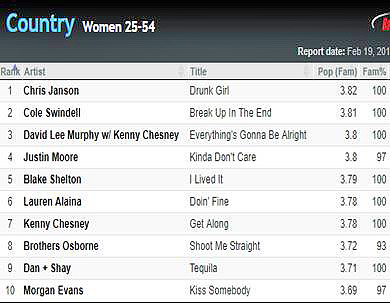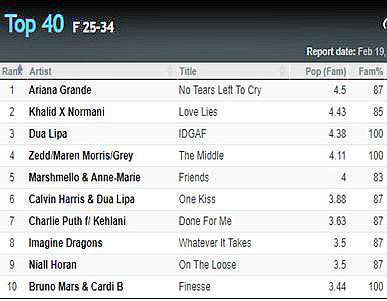-
Just Some Rules I Used To Know
March 1, 2019
Have an opinion? Add your comment below. -
If you're the kind of person who gets up in the middle of the night to pee, avoid Switzerland. "A man may not relieve himself while standing up after 10 p.m." No flushing the toilet late at night either. It's the law. Down in Italy, keep your frown upside down. Milan requires citizens to smile constantly in public. You get a pass if you're a hospital worker, or at a funeral. There must have been legit reasons for these laws at some point, right? Same goes for a lot of radio rules. Maybe a few of ours are about as silly as handling salmon "in a suspicious manner" (a 'no-no' in the U.K.). If nothing else, here are some things I've been re-thinking lately.
FAMILIARITY IS KING?
People like what they know, and know what they like. Unfamiliar music (or unfamiliar anything) is the enemy. I generally buy into this, but I think there can be exceptions. Otherwise, we'd never play new music, try new promotions, create new benchmarks, etc.
Here's my unproven, totally anecdotal, 100% personal example: as in, I might be wrong. My wife is a Country radio P1. EVERY song they play on Country radio, she loves. Bobby Bones can do no wrong. Does she know all the artists or titles? Not quite. Has she even ever heard the song she's swaying to while we drive? The answer isn't always yes. But her lack of familiarity doesn't send her button pushing.
For Jennifer, she's bought into the Country lifestyle. The vibe of the songs, the DJ's, and the station brand. For her to go elsewhere, the station would have to take their four-wheeler thousands of miles off the dirt road the Country format revolves around.
My takeaway: some careful deviation from what's known and loved can be a good thing. IF my brand has a trusted, strong, emotional connection with my P1's. If my brand isn't strong enough to keep a loyal listener around through the properly placed unfamiliar element, I have a much bigger problem on my hands.
HOLD ON TO YOUR HITS?
Up until a couple of years ago at KLJY, we used to play every good testing song in Heavy for a up to year or more. But not all good songs are created equal. Not every song good enough for Heavy is the next "Even If" or "Reckless Love." In CCM, if you allow your online testing to dictate your song moves, you will rarely make any moves. Our audience doesn't burn out on our hits. EVER. At some point, depending on what you're trying to accomplish, it's up to the MD/PD to keep things fresh. If I was to paint solely by my online panel's numbers, I could still have "I Can Only Imagine" playing every three hours.

CCM is a different animal than mainstream formats. Look at how many of our songs test well vs. how many mainstream currents test well at any given time. Chances are, if you're a typical Christian AC with an online panel of self-selected P1's (listeners who signed themselves up...you didn't recruit them scientifically...that's a can of fried worms we'll open in a couple moments), the majority of your currents are above a 4. At our AC in St. Louis, the typical weekly test usually only has four or fewer songs under a 4.0 on the 1-5 scale.
Travel over to the Rate the Music section of the mainstream formats at allaccess.com. You're going to be hard pressed to see more than 50% of Currents in most formats hitting a 4.0 or higher. If you're in their shoes you hang onto those hits for dear life, and cycle the rest out. Keeping things fresh is baked into the DNA of those formats. For CCM, we have to be intentional about it. It's going to be one of those things research as we currently conduct it won't tell us.


At JOY-FM and BOOST Radio, we switched to spin benchmarks instead of going solely by test scores. Once a song crosses that threshold, it's a candidate for Recurrent or Stay Current. We make exceptions for the most exceptional songs, but not for every song that was good enough for Heavy.
Since changing our approach at KLJY, we've enjoyed the best ratings in the history of our brand. Maybe we're getting lucky with meters, maybe the growth is due to other factors. It's hard to argue this change hurt us though.
HOLDING ON, PART 2
Side-note observation: I've watched this play out both in mainstream and Christian formats. Stations who use research tend to hold onto songs a lot longer than those who don't use research. It makes sense if you think about it. With no objective listener feedback to reference, you're going to burn out on songs a lot faster than your audience because you're exposed to them a lot more. Research pulls us the other direction, especially in a format where nearly every Current tests decently. Like with so many things, the right choice is often somewhere between what you would do on your own and where research might lead you to with no other factors in the mix.
THE POWER OF RESEARCH?
Most stations in our format live and die by our online panels. These listeners, love them though we do, aren't a reflection of reality. They opted themselves into your database. (How many online panels for any product you LOVE have you sought out?) Most stations don't verify their panel members are who they say they are, and most don't make any effort to have their online samples reflect the actual overall audience. All the while, we split hairs and act like a song that scores a 4.27 is much more valuable than a song that scores a 4.19. A modest margin of error alone could swing each of those numbers wildly.
Here's what online research as most currently use it is good for: it helps you spot the superstar songs, and the dogs. On every test, you likely have 2-3 songs that score much higher than even your other good testing tunes. (Those are the ones I might keep in Heavy for a lonnnnnnnnnnng time.) And you have hopefully just a small handful of songs at the bottom. In between your superstars and the bottom are a bunch of songs with decent, playable scores. There's no law that says you have to play them though. Or drop them. Unless you're investing in making your panel a true, statistically accurate sample of your audience, the numbers you see aren't Biblical. They're not infallible. In fact, they're highly suspect.
Our approach at KLJY: we use our online panel to identify the huge hits and the huge misses. Everything in between is a judgment call. Which songs help us create the optimal texture, mood, and reinforce values that are important to our purpose? Which songs don't help? As a programming decision maker, that's your call. It's where you turn on your brain and let the art of our art and science play a role.
NEVER SAY I/ME/WE/US?
Radio is an intimate, one on one medium. Me to you. Early in our career, most have been coached to work "YOU" into breaks a lot, to show the listener we're all about them. The word "you" isn't a silver bullet if the content isn't on-point in the first place.
Steve Reynolds recently spoke at the CMB Air Talent summit. Two of the most compelling moments came when he shared stories that happened to him. He didn't bust out "you" to get my attention. Steve simply shared his own riveting experiences.
That's where I want to live: offering content so compelling that semantics over "you" vs. I/me/we/us aren't even a factor. It's not so much about the word "you" as it is about your listener seeing themselves in what you're saying. Give them more "me too" moments.
MAKE THE LISTENER THE STAR?
A lot of us have taken this to mean the more phone calls on our shows, the better. The more listeners in our imaging, the better. I'm all about getting a lot of phone calls on my shows and listener drops in our imaging, don't get me wrong. (On the air, relying on phones have been a crutch for me, honestly.) There's a danger in having listener audio on for its own sake, when it really adds no value to the break or imaging piece.
With apologies to my listeners, you're not the star of my show. Humbly, I am. (No. Jesus is! JUKE!) I'm the one who's accountable to grow ratings and pull my weight during our fundraisers. I'm the one who's invested countless hours of my life towards perfecting my craft. I'm the one responsible for creating content so noteworthy you can't help but lean in. Or take the long way home. And maybe even talk with others about what you heard.
You know who has this figured out? Politics and morals aside, it's folks like Rush Limbaugh and Howard Stern. I've never met a Limbaugh or Stern fan rave about how they can't wait for the next show to hear what the callers will say. These pro's use calls to sharpen their own content. They don't rely on the calls to BE the content. Notice how differently their calls pace vs. how most of our format's calls do.
YOU DIDN'T EXCHANGE VOWS WITH "THE RULES."
You didn't say "Til Death Do Us Part" to your music software rules or airchecking truths (I hope). Radio rules weren't handed down to us from Moses via a burning bush. A lot of us wish it were as simple as figuring the magic, winning approach out and locking it in forever. The outcome of that would probably send us the way of dot matrix printers.
Let's not abuse the cliché' "Rules are made to be broken" though. Good radio will always be good radio. Intimate. Immediate. In the moment. Tight. Energizing. Inspirational. Fun. How we get there should always be evolving.
-
-
